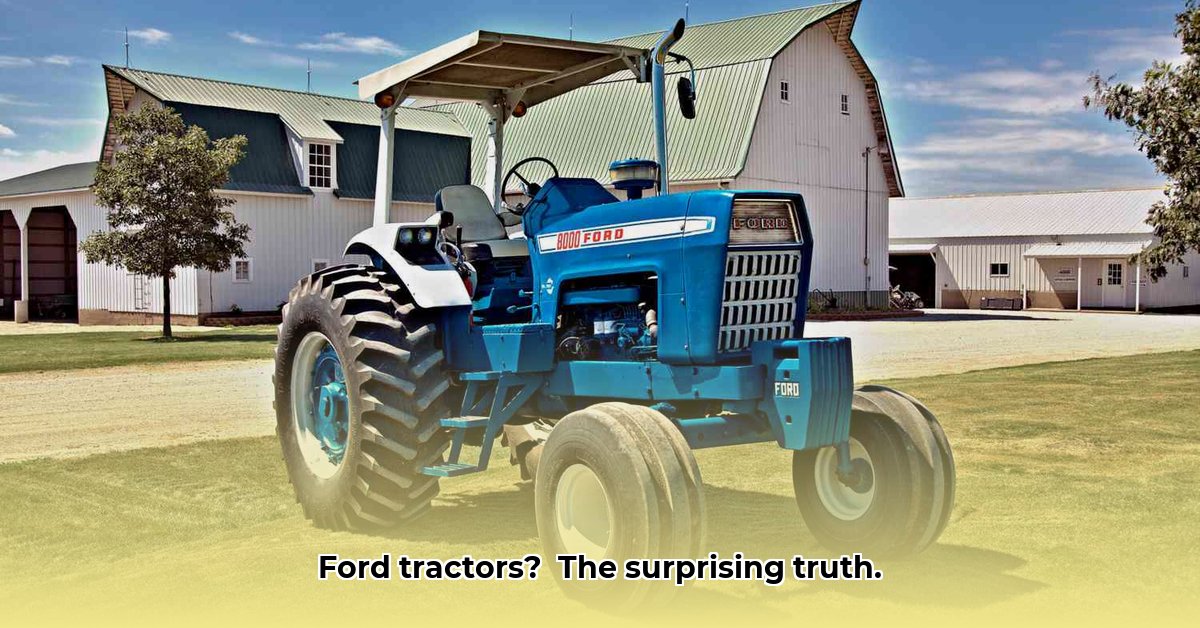
Do Ford Still Make Tractors? A Legacy of Innovation
The iconic blue Fordson tractor, a symbol of agricultural progress in the early 20th century, revolutionized farming practices. Henry Ford's impact extended beyond the automobile; his innovative approach to mass production made tractors more accessible and efficient, reshaping the agricultural landscape. But the question remains: does Ford still produce tractors? The answer is no, not directly. Ford’s tractor division, once a dominant force in innovation, underwent a significant shift, ultimately leading to the sale of its agricultural machinery arm. This transition, far from marking an end, marks a fascinating chapter in the history of agricultural technology and sustainability. For more details on Ford's exit from tractor manufacturing, see this helpful resource.
From Ford Tractors to New Holland: A Transformation
Ford's decision to divest its tractor manufacturing wasn't sudden; it was a strategic response to evolving market dynamics and emerging business priorities. This pivotal moment transferred the legacy of Ford's agricultural innovation to New Holland Agriculture. The familiar blue tractors, so deeply ingrained in the memories of generations of farmers, were gradually replaced by New Holland's branding and product line. Ford's own-brand tractor production ceased, marking a distinct end to an era.
However, Ford's contributions didn't vanish with the sale. Their innovative designs and engineering advancements continue to influence modern tractor design and functionality, shaping the technology used in today's farming practices. This subtle but lasting influence echoes through the agricultural machinery sector - an unseen but undeniable testament to Ford's legacy.
New Holland's Sustainability Initiatives: A Green Revolution?
Today, sustainability is not a peripheral issue in agriculture but a central imperative. Farmers, consumers, and governments alike are demanding environmentally responsible agricultural practices. New Holland, inheriting Ford’s agricultural legacy, faces the significant challenge of leading the industry towards a greener future. But how successful are their efforts?
New Holland is actively investing in research and development, pushing the boundaries of tractor technology, and exploring alternative fuel sources, including the potential of hydrogen power. This transition, however, is a complex and lengthy undertaking, resembling a marathon rather than a sprint. The complete decarbonization of the agricultural sector requires substantial time and investment, and the full extent of New Holland's progress remains a subject of ongoing assessment and debate.
The Future of Farming: Navigating Challenges and Opportunities
The future of agriculture hinges on innovation and sustainable practices. Imagine a world where farms operate on renewable energy, significantly reducing their carbon footprint; this is the vision that drives ongoing efforts. While New Holland explores promising avenues like hydrogen-powered tractors, significant obstacles remain. The substantial initial costs associated with such technologies, along with uncertainties about their long-term durability and reliability, pose considerable challenges. A comprehensive consideration of the broader economic and environmental consequences of such a technological shift is critical.
Actionable Steps: A Collaborative Path to Sustainable Agriculture
Achieving true sustainability in agriculture mandates a concerted effort from various stakeholders.
- Farmers: Thoroughly research and compare New Holland's offerings, prioritizing fuel efficiency and minimized environmental impact.
- Researchers: Conduct rigorous assessment of the environmental footprint of existing farm equipment and actively develop environmentally responsible alternatives.
- Manufacturers: Enhance transparency by accurately reporting sustainability metrics and prioritize investment in sustainable technologies.
- Governments: Implement supportive policies that incentivize the adoption of eco-friendly technologies and foster research and development in the field.
Ford's Enduring Influence: A Testament to Innovation and Adaptation
While you won't find a new Ford tractor on the market, their revolutionary influence on the agricultural world remains undeniable. The answer to "Do Ford still make tractors?" is multifaceted. Their pioneering spirit lives on, albeit indirectly, in New Holland's ongoing commitment to shaping a more sustainable future for farming. The journey towards truly sustainable agriculture requires continuous innovation, adaptability, and a collective commitment from all stakeholders. It's a journey still in progress.
Comparing New Holland's Sustainability Metrics: A Practical Guide
While Ford's legacy in tractor manufacturing is undeniable, New Holland, now under CNH Industrial, has inherited a substantial part of that legacy. This raises crucial questions regarding sustainability and the need for effective comparison with competitors.
Assessing Sustainability Beyond Marketing Claims
Comparing tractors solely based on horsepower is insufficient. A deeper analysis encompassing the following is essential:
- Fuel Efficiency: Look beyond advertised figures. Independent testing results offer more reliable comparisons. For example, New Holland's T7 series showcases impressive fuel efficiency due to its advanced SCR engine technology.
- Emissions: stringent environmental regulations necessitate examining a tractor's impact on air quality.
- Lifecycle Analysis: Consider the entire lifespan impact, from manufacturing to disposal. This requires manufacturers' transparency.
- Durability and Longevity: A longer-lasting tractor reduces resource consumption, offsetting initial costs.
Practical Steps for Effective Comparison:
- Gather Data: Utilize independent sources—avoid solely relying on manufacturer claims.
- Analyze Specifications: Compare key metrics like horsepower, fuel consumption, and emission levels.
- Consider Lifecycle Costs: Include maintenance, repairs, and resale value in your assessment.
- Seek Independent Reviews: Online forums and review sites provide invaluable real-world perspectives.
- Consult Experts: Seek advice from agricultural consultants or experienced farmers.
Key Takeaways:
- Sustainability is paramount in modern agriculture.
- Holistic tractor evaluation extends beyond horsepower.
- Independent data and reviews are essential for informed decisions.
- New Holland's commitment to fuel-efficient technology is a significant factor.
- Understanding a tractor's full lifecycle impact is critical for long-term effectiveness and responsible farming.